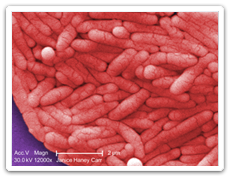Typhoid and Paratyphoid Fever (Salmonella typhi or S. paratypli)
 Salmonella typhi (S. typhi) are bacteria which infect the intestinal tract and the blood. The disease is referred to as typhoid fever. Salmonella paratyphi (S. paratyphi) bacteria cause a similar, but milder illness, which comes under the same title. S. typhi and S. paratyphi come from the same sources and are common in many developing countries where sewage and water treatment systems are poor.
Salmonella typhi (S. typhi) are bacteria which infect the intestinal tract and the blood. The disease is referred to as typhoid fever. Salmonella paratyphi (S. paratyphi) bacteria cause a similar, but milder illness, which comes under the same title. S. typhi and S. paratyphi come from the same sources and are common in many developing countries where sewage and water treatment systems are poor.
Image Content Provider: CDC
Symptoms
Symptoms can appear gradually in three days to three months after a person becomes infected, with the average being one to three weeks. Symptoms can include fever, headache, fatigue, loss of appetite, dizziness, cough and a rash on the trunk of the body. Constipation is more common than diarrhea. S. typhi is a serious illness and can be life threatening.
Causes
Salmonella species are spread by the fecal-oral route, either directly by person-to-person contact (e.g. changing diapers, sexual practices) or indirectly by eating or drinking fecally contaminated food or water prepared by someone who is infected or a carrier. A carrier is someone who has recovered from being ill, but continues to carry the bacteria in their body and can infect others. A person can also become ill by consuming ready-to-eat food that has been contaminated by sewage, such as fruit fertilized with night soil and eaten raw, or shellfish from sewage contaminated beds (particularly oysters). S. typhi is most often acquired while travelling internationally.
Treatment
Antibiotic treatment is required for S. typhi infections. Even if symptoms are no longer present, antibiotics will help clear the bacteria from a person's system so that they do not pass the infection on to others.
Prevention
Persons travelling to countries where S. typhi is common should receive typhoid vaccine prior to departure. The typhoid vaccines do not protect against S. paratyphi infection. Travelers should be aware that typhoid immunization is not 100% effective, and typhoid fever could still occur, therefore practicing proper hand hygiene and being aware of the foods a person eats and where they buy them is very important. Eating raw or undercooked fish or shellfish, especially oysters, is not recommended. Avoid eating foods from street vendors and do not consume unpasteurized (raw) milk or raw milk products. When travelling where the water supply may be unsafe, drink bottled water and avoid uncooked foods washed with unboiled tap water.
Manitoba Health Resources
For Health Care Providers
Other Resources
- Health Canada - Typhoid
- BC Centre for Disease Control - Typhoid Fever
- Centers for Disease Control and Prevention - Typhoid Fever
Communicable Disease
Control (CDC) Health Links – Info Santé |



